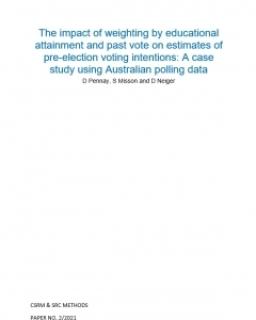
Abstract
The use of statistical adjustments (‘weighting’) to reduce bias in the estimates of voting intentions produced by pre-election opinion polls is an important issue for pollsters to consider. The weighting of pre-election polls was one of the main issues explored in the recent inquiry into the performance of the pre-election polls at the 2019 Australian federal election (initiated by the Association of Market and Social Research Organisations with the support of the Statistical Society of Australia).
This paper builds upon the work of that Inquiry and, in particular, looks at the efficacy of adding measures of educational attainment and past voting behaviour to the standard weighting solutions typically used by the commercial pollsters. The data used in this study are from a pre-election survey conducted by the ANU in April 2019.
We find that the amount of bias in estimates of voting intentions is routinely reduced, with only a minor impact on variance, when poststratification to educational attainment benchmarks is added to the standard weighting solution. We also find that poststratification to past vote benchmarks reduce bias when the measure of past vote that is used in one that is collected from respondents in close proximity to the previous election (a short-term recall measure of past vote). This reduction in bias is not observed when using a measure of past vote collected from respondents proximate to the next election (a long-term recall measure of past vote).
File attachments
| Attachment | Size |
|---|---|
| CSRM-SRC_Methods_Paper_2_2021_resubmission_201021.final_.pdf(658.75 KB) | 658.75 KB |